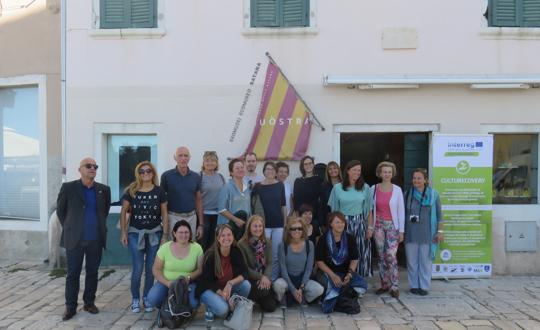
Culturecovery project aims to educate in preservation of intangible cultural heritage, and the meeting of the Governing Board brought together in early October partners from Slovenia, Austria, Italy, Hungary and Poland to Rovinj, where they were hosted by the Batana Eco-musem/Ecomuseo batana.
The Batana Eco-museum/Ecomuseo batana has become a recognizable part of Rovinj's tourist offer during its 15 years of existence, and also an example of good practice in the preservation of intangible cultural heritage. In order to share the knowledge and experience obtained during a number of challenging years in its history with other participants in the preservation of Istrian intangible cultural heritage, the Batana Eco-museum, along with the Municipality of Mošćenička Draga, became a Croatian partner in Interreg's Culturecovery project, whose Governing Board held its meeting on 3 October in Rovinj.
Partners gathered at Hotel Eden where, in a constructive and productive atmosphere, they discussed achievements, common strategies, training programs, action plans and many other topics related to the preservation of intangible cultural heritage through eco-museum practices. The Culturecovery project leader at the Batana Eco-museum and its Program Manager Tamara Nikolić Đerić presented a didactic kit intended for preschool and primary school children that the Eco-museum will realize as part of the Culturecovery project.
The working part was followed by the first part of the study visit during which the partners discovered the components of the Eco-museum in a guided tour along thematic maritime route through Rovinj to the tavern of Spacio Matika. In a cheerful atmosphere our partners had a taste of the Rovinj gastronomic heritage while enjoying fish menu and listening to bitinaduri, singers of traditional Rovinj songs listed in the Register of Cultural Goods of the Republic of Croatia.
The second part of the study visit was organized on 4 October. On this occasion, on an expert guided tour the partners compared the concepts and functioning of their eco-museums with the Batana Eco-museum interpretation center. The sunny day has created an unforgettable backdrop for the most attractive activity of the Batana Eco-museum – a ride in batana in Rovinj seas, with the aim of learning about shipbuilding and other related phenomena. The study visit continued in the Municipality of Mošćenička Draga, another Croatian partner on the project, where our partners visited the Eco-museum "The House of the Sea" dedicated to the fishing and maritime heritage. The two-day gathering of the partners in the Culturecovery project ended with a visit to Mošćenice, its ethnographic collection and the Mošćenički toš (olive-press), and a remarkable view of the Kvarner Bay during the closing lunch.
Project leaders from the Italian Cervia, where the Eco-museum of Salt and Sea is located, expressed their satisfaction with the meeting and study tour. The other partners agreed, and all left Istria and Kvarner with a range of concrete, inspirational examples of the preservation of intangible heritage.